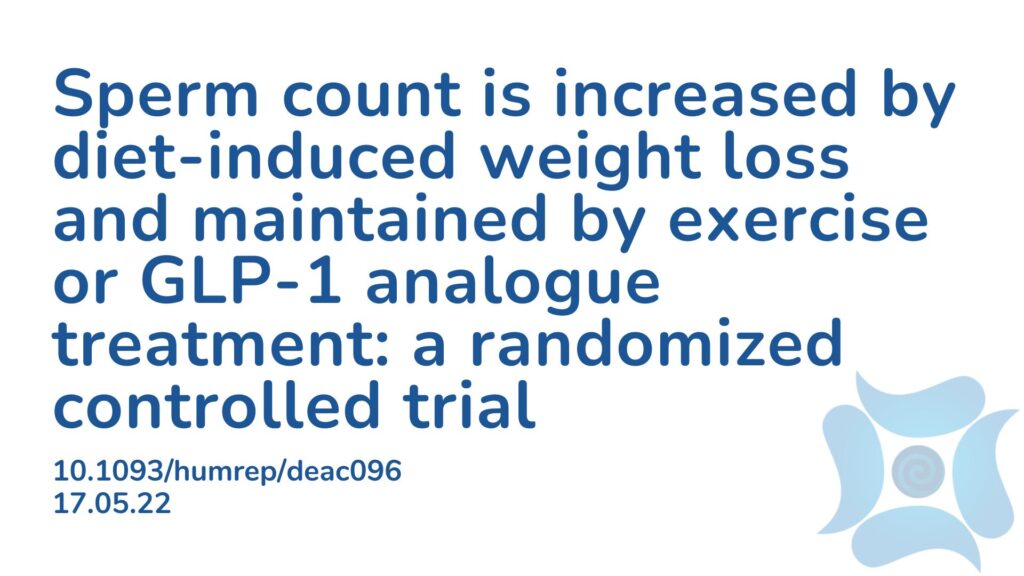Summary: Since the mid-1970s, there has been an observed reduction in the male sperm count with sperm counts declinig by over 52% between 1973 and 2011. This a significant reduction, sometimes being reported as a crisis and therefore understanding any potential modulations of male fertility is critically important. This randomised controlled trial (RCT) aimed to assess whether weight loss induced by dietary changes improved semen parameters, and if those potential improvements could be maintained if the weight loss was sustained. This study included a total of 56 men who were assigned to an 8-week low-calorie diet of 800 kcal/day. The results of this RCT shows that sperm concentration and sperm count improved after weight loss induced by diet in obese men, and that weight maintenance strategies such as insulin modulating medication or exercise can be used to maintain the positive effects to sperm concentration and count. The men included in this RCT who lost weight from calorie restriction had increase in sperm concentration of 50 percent and sperm count of 40 percent. For those who sustained the weight loss up to 52 weeks, the men maintained the improvements to semen quality. It is clear that lifestyle and dietary choices play a large role in male fertility, however Australia is still one of the most heavily impacted countries by the fertility crisis. The Australian federal government has established funding for a program called The Healthy Male to try and tackle the problem, which is intended to support male reproductive health.
Abstract:
STUDY QUESTION: Does diet-induced weight loss improve semen parameters, and are these possible improvements maintained with sustained weight loss?
SUMMARY ANSWER: An 8-week low-calorie diet-induced weight loss was associated with improved sperm concentration and sperm count, which were maintained after 1 year in men who maintained weight loss.
WHAT IS KNOWN ALREADY: Obesity is associated with impaired semen quality. Weight loss improves metabolic health in obesity, but there is a lack of knowledge on the acute and long-term effects of weight loss on semen parameters.
STUDY DESIGN, SIZE, DURATION: This is a substudy of men with obesity enrolled in a randomized, controlled, double-blinded trial (the S-LITE trial). The trial was conducted between August 2016 and November 2019. A total of 56 men were included in the study and assigned to an initial 8-week low-calorie diet (800 kcal/day) followed by randomization to 52 weeks of either: placebo and habitual activity (placebo), exercise training and placebo (exercise), the Glucagon Like Peptide 1 (GLP-1) analogue liraglutide and habitual activity (liraglutide) or liraglutide in combination with exercise training (combination).
PARTICIPANTS/MATERIALS, SETTING, METHODS: Inclusion criteria were men who delivered semen samples, 18 to 65 years of age, and a body mass index between 32 and 43 kg/m2, but otherwise healthy. The study was carried out at Hvidovre Hospital and at the University of Copenhagen, and the participants were from the Greater Copenhagen Area. We assessed semen parameters and anthropometrics and collected blood samples before (T0), after the 8-week low-calorie dietary intervention (T1), and after 52 weeks (T2).
MAIN RESULTS AND THE ROLE OF CHANCE: The men lost on average 16.5 kg (95% CI: 15.2–17.8) body weight during the low-calorie diet, which increased sperm concentration 1.49-fold (95% CI: 1.18–1.88, P < 0.01) and sperm count 1.41-fold (95% CI: 1.07–1.87, P < 0.01). These improvements were maintained for 52 weeks in men who maintained the weight loss, but not in men who regained weight. Semen volume, sperm motility and motile sperm count did not change.
LIMITATIONS, REASONS FOR CAUTION: The S-LITE trial was a randomized controlled trial of weight loss maintenance. Analysis of semen was pre registered to explore the effects of weight loss and weight loss maintenance on semen parameters, but definite inferences cannot be made.
WIDER IMPLICATIONS OF THE FINDINGS: This study shows that sperm concentration and sperm count were improved after a diet-induced weight loss in men with obesity. Our findings indicate that either or both liraglutide and exercise as weight maintenance strategies may be used to maintain the improvements in sperm concentration and count.
Article Publication Date: 17.05.22
DOI: 10.1093/humrep/deac096




